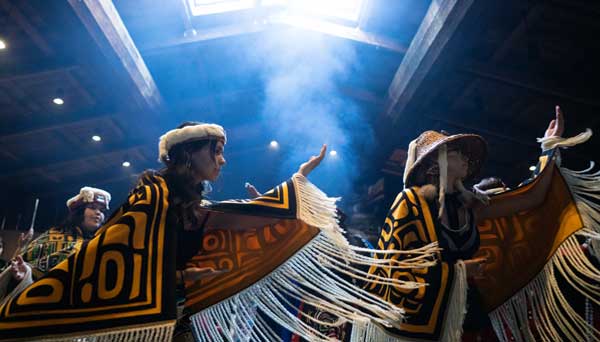Join the CEC in Celebrating the International Day of the World’s Indigenous Peoples 2023
August 9 is the International Day of the World’s Indigenous Peoples, where we recognize and celebrate the unique heritage, diverse cultures and resilience of Indigenous Peoples across the world. This important day is also a time to reflect on the colonial histories, oppression and violations of the rights of Indigenous Peoples and re-commit to honoring Indigenous voices, experiences and stories. The theme for this year is ‘Indigenous Youth as Agents of Change for Self-Determination.’
Indigenous Peoples have lived on this land since time immemorial and have shaped the North America / Turtle Island / Inuit Nunangat that we know today. The Commission for Environmental Cooperation (CEC) is committed to recognizing and promoting the respect of Indigenous Peoples rights, including the right to self-determination, in environmental activities and decisions across North America and the world. In addition to learning from and listening to Indigenous Peoples, the CEC is proud to partner with Indigenous Peoples to support their self-determination and integrate Traditional Ecological Knowledge (TEK) into environmental activities, projects and decisions.
In 2015, the CEC announced the creation of the TEK Expert Group to advise and guide the CEC and the Governments of Canada, Mexico and the United States on how to work in partnership with Indigenous Peoples and respectfully include, strengthen and protect TEK while advancing North American priorities. The TEK Expert Group is the first TEK panel to contribute to an intergovernmental organization like the CEC. The appointed members of the TEK Expert Group work collectively to promote the greater inclusion of Indigenous Peoples in decision-making and have been instrumental in developing strategic policy recommendations and advancing environmental collaboration across North America.
“The TEK Expert Group remains focused on meaningful engagement of Indigenous Peoples and communities at every possible level of CEC work. As we move across North America, Indigenous values and priorities are invaluable and insightful,” said Kathy Hodgson-Smith, TEK Expert Group Facilitator.
The TEK Expert Group is currently focused on advancing the recognition and application of Indigenous approaches to freshwater management. For many Indigenous Peoples across North America, water is sacred and the source of all life. Freshwater management can only be enhanced by decolonizing conventional governance approaches and recognizing Indigenous Peoples' inherent rights and relationships to water.
By advocating for Indigenous Peoples to be included in the discussions and decision-making processes, the TEK Expert Group and the CEC are supporting Indigenous leadership in taking climate actions towards clean growth, conservation and environmental protection. In particular, involving Indigenous youth in these discussions, partnerships and decisions offers innovative ideas and solutions to help us make more effective environmental decisions.
“Since time immemorial, Indigenous Peoples of North America have built vibrant and diverse cultures—safeguarding homeland, language, spirit, knowledge and tradition across the generations. The Commission for Environmental Cooperation is celebrating the International Day of the World’s Indigenous Peoples and acknowledges the invaluable contributions and resilience of Indigenous youth and commits to their honoring for the 7th Generation as agents of change for self-determination,” said Octaviana Trujillo, CEC Joint Public Advisory Committee Chair.
Please join us in learning about the histories of Indigenous Peoples of North America and in celebrating and supporting the distinct contributions, cultures and leadership of Indigenous Peoples to enhance our shared understanding of the environment and support our environmental activities and goals.

About the CEC
The Commission for Environmental Cooperation (CEC) was established in 1994 by the governments of Canada, Mexico and the United States through the North American Agreement on Environmental Cooperation, a parallel environmental agreement to NAFTA. As of 2020, the CEC is recognized and maintained by the Environmental Cooperation Agreement, in parallel with the new Free Trade Agreement of North America. The CEC brings together a wide range of stakeholders, including the general public, Indigenous people, youth, nongovernmental organizations, academia, and the business sector, to seek solutions to protect North America’s shared environment while supporting sustainable development for the benefit of present and future generations
The CEC is governed and funded equally by the Government of Canada through Environment and Climate Change Canada, the Government of the United States of Mexico through the Secretaría de Medio Ambiente y Recursos Naturales, and the Government of the United States of America through the Environmental Protection Agency.